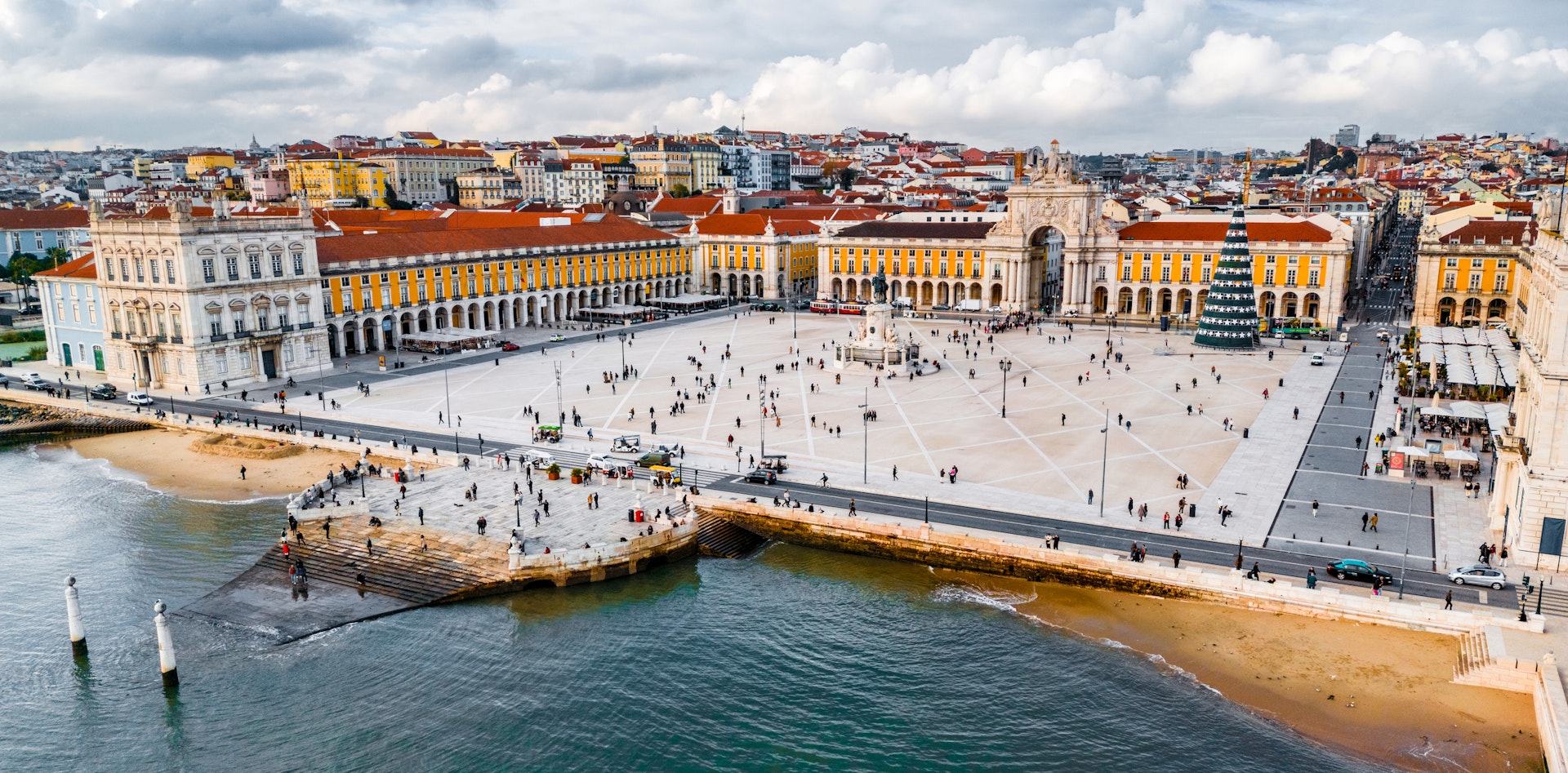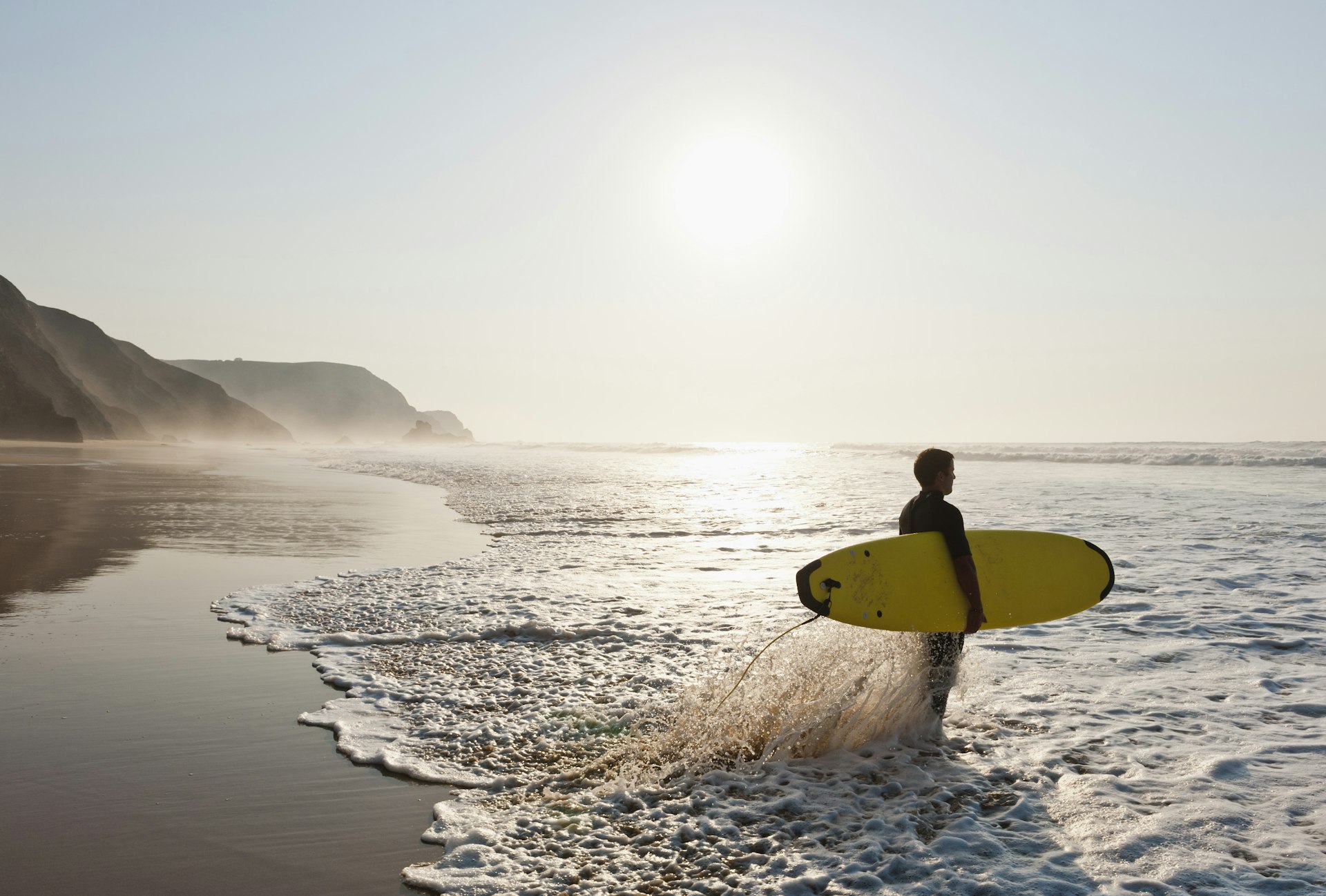For a packed calendar of traditional celebrations, decadent food festivals, outdoor concerts and many other events, head to Portugal. Summer is the time to catch the biggest range of activities, but in truth, there’s always something happening here.
Festivals aside, it’s not easy to pin down the best month to visit Portugal. That really depends on what you’re after: outdoor activities in the south? Go in winter when the crowds and prices are thinnest, and the weather is pleasant but not hot. Beach days with plenty of time in the surf? Visit in summer when the water temperatures are warmest. A mix of urban exploring and hiking adventures in the wilderness in the north? Opt for the shoulder season when it’s not so rainy, and the cities aren’t yet filled with tourists.
Whatever you’re seeking, you’ll find your ideal scenario in our month-by-month run-down of what’s going on in Portugal.
The high season – June to August – is the best time for the beach
During the summer months, you’ll find warmer ocean temperatures, especially as you head south to the Algarve. Water temps and crowds alike peak in July and August, so plan on sharing those pretty beaches with plenty of other sunseekers.
Wherever you go, expect higher prices, as accommodation prices typically increase by 30% or more during the summer high season. On the plus side, this is one of the most festive times to be in Portugal, with big national celebrations, as well as lots of local outdoor events (including concerts and film screenings).
Low season months of November to March are a cheaper time to visit
If you want to escape the crowds and enjoy rock-bottom prices on accommodations, plan your trip for the low season. Many museums and other attractions keep shorter hours, though you’ll still find a full lineup of performances in cities and bigger towns.
If you come in the winter, you’ll need to prepare for changing weather conditions – rain in Porto and the north, and freezing temperatures at higher elevations. The south, however, has ample sunshine, so it’s a fine time for clifftop walks in the Algarve. The sea is quite cold, but the biggest waves arrive in winter (especially in December), making it a big draw for surfers.
Go in April, May, September and October for outdoor adventures
During the shoulder season, you’ll find mild, often sunny days that are ideal for hikes, bike rides and other outdoor activities. This is a great time to check out Portugal’s top natural wonders without the heavy crowds. Springtime brings a blanket of wildflowers across the country, as well as some major religious holidays like Holy Week.
The fall can be a magical time to visit Portugal, with changing leaves in the north coupled with grape harvests (and harvest festivals). As with spring, the beaches are much quieter and quite inviting (from mid-September onward), though ocean temperatures can be bracing.
Here’s what’s going on month-by-month through the year in Portugal.

Enjoy tranquil escapes in January
January is a peaceful month to visit, though the weather can be patchy and cool. Dia de Reis (Three Kings’ Day) brings the Christmas festivities to a close on January 6.
Key events: Dia de Reis, IndieJúnior children’s film festival in Porto.
Celebrate Carnaval in February
February is one of the quietest times for overseas visitors, meaning you won’t have to book months in advance for lodging. It can be quite rainy in the north, and you can even go skiing at Torres (Portugal’s sole ski resort). Coastal temperatures are cool but mild.
Key events: Carnaval, Fantasporto, Al-Mutamid Music Festival, Volta ao Algarve bicycle race, Essência do Vinho in Porto.
March is for scenic walks without the crowds
March days are rainy and chilly in the interior and the north of Portugal, though the south sees ample sunshine. Prices and visitor numbers remain low.
Key events: Feira do Março in Aveiro and Feira dos Enchidos in Monchique.
April brings springtime blooms
Spring arrives with a flourish, bringing warmer temperatures and abundant sunshine in both the north and the south. April sees a profusion of wildflowers in the south. Easter processions add excitement, as does Liberation Day (April 25), when you can see parades and fireworks in some towns.
Key events: Óbidos Chocolate Festival, Semana Santa, Ovibeja, Liberation Day.
May is the month for outdoor adventures
Lovely sunny weather makes May an ideal time to visit, especially if you’re hitting a long-distance trail like the Via Algarviana or the Rota Vicentina. The crowds are beginning to arrive in Lisbon, Porto and the Algarve, though it’s still a fairly relaxed scene compared to the summertime high season.
Key events: Feira das Cantarinhas, Queima das Fitas, Festa das Cruzes, Festa do Homen do Mar.

Join the revelry in June
Early summer is one of the liveliest times to visit, as the festival calendar is packed. Warm, sunny days are the norm, and while tourism picks up, the hordes have yet to arrive (especially in the first half of the month).
Key events: Fado no Castelo, Festival Med, Vaca das Cordas & Corpus Christi, Festas dos Santos Populares, Festa de Santo António, Festa de São João.
July brings heat, crowds and outdoor festivals
The summer heat arrives, bringing sunseekers who pack the resorts of the Algarve. Lisbon and Porto also swell with crowds, and prices soar in July and August. Book outdoor dining at terrace restaurants overlooking the seaside, catch open-air concerts and film screenings and browse for treasures at street markets.
Key events: Mercado Medieval, Festival dos Canais, MEO Marés Vivas.
August is perfect for time in the sea
The mercury soars in August, with sweltering days best spent at the beach, or, better yet, in the water (surfing, snorkeling, SUP adventures). This is Portugal’s busiest tourist month, and reserving months ahead is essential.
Key events: Porto Busker Fest, Silves Medieval Festival, Festas Gualterianas, Festival MEO Sudoeste, Romaria de Nossa Senhora d’Agonia, Feira de São Mateus, Festa de Nossa Senhora dos Remédios.

Temperatures start to cool in September
Peak tourist season officially runs until mid-September, when ongoing warm weather ensures beaches remain packed. Things cool down a bit, and prices dip as the crowds dissipate towards the end of the month.
Key events: Festas do Sítio Nazaré, Queer Lisboa Film Festival, Feiras Novas Ponte de Lima, Concertos na Avenida Porto, Festival Flamenco Lagos.
October is harvest season in wine country
As the temperatures cool, head to the vineyards of the Douro, where you can see grape harvesting and treading, and even help out. October is also a great month for bird-watching, with many species passing through en route to Africa during the annual fall migration.
Key events: Amplifest, Festival Gastronómico Francesinha, Oktoberfest, Feira de Santa Iria in Faro, Feira de Praia Vila Real de Santo António.
Places to stay are cheaper in November
Along the coast, you’ll have lovely seaside views all to yourself but will need to pack a light jacket for cooler days and nights, plus the odd rain shower. Things are getting even colder and wetter in the north.
Key events: Porto Marathon, Feira Nacional do Cavalo, Festa de São Martinho, Walk & Art Fest in Barão de São João.
December means Christmas festivities
Long nights and cooler days can’t dampen the Christmas spirit, with holiday markets, roasted chestnuts and colorfully decorated squares. Days are mostly pleasant in the south but brisk at night, while the north sees cold, rainy days and nights.
Key events: Festa dos Rapazes, New Year’s Eve fireworks.
